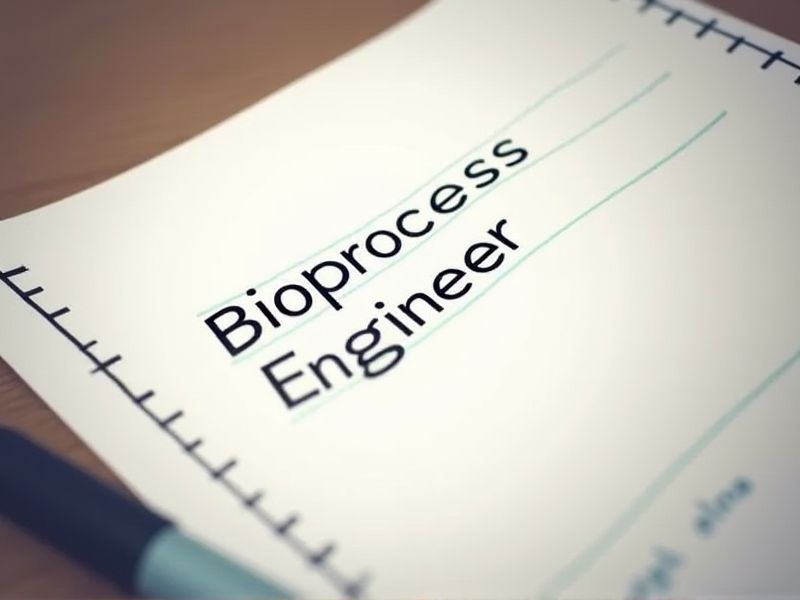
Bioprocess Engineers are tasked with developing processes to produce valuable biological products, which requires a deep understanding of the science and technology involved. Certain certifications ensure that these engineers are up-to-date with industry standards and can effectively adhere to regulatory requirements. These certifications also demonstrate a commitment to continuous professional development and technical expertise in the field. Below are key certifications that a Bioprocess Engineer might consider obtaining.
Certified Six Sigma Green Belt
A Certified Six Sigma Green Belt equips a bioprocess engineer with problem-solving tools to reduce process variability, enhancing product consistency. The methodology reduces waste and inefficiencies in production, leading to cost savings and optimized resource utilization. It enables engineers to implement data-driven decision-making, improving process reliability and outputs. The certification provides a framework to systematically improve quality controls, critical for compliance in regulated industries like biotechnology.
Certified Six Sigma Black Belt
Having a Certified Six Sigma Black Belt equips a Bioprocess Engineer with advanced problem-solving skills essential for optimizing processes. This certification provides the engineer with the tools to reduce variability and defects in bioprocess manufacturing, leading to more consistent product quality. A Black Belt's expertise in data-driven decision-making enhances efficiency and cost-effectiveness in bioproduction. The certification also fosters leadership capabilities, allowing the engineer to effectively lead cross-functional teams and drive continuous improvement initiatives.
Project Management Professional (PMP)
Project Management Professional (PMP) certification equips bioprocess engineers with essential skills to effectively manage complex projects and resources. Bioprocess projects often involve multidisciplinary teams, and PMP provides structured methodologies to ensure coordinated efforts. With PMP, engineers can enhance communication and decision-making processes, reducing project risks and delays. In a competitive industrial landscape, possessing PMP certification can distinguish bioprocess engineers, opening pathways for career advancement and leadership roles.
Good Manufacturing Practices (GMP) Certification
Good Manufacturing Practices (GMP) Certification ensures that bioprocess engineers adhere to stringent quality standards necessary for product safety and efficacy. Compliance with GMP reduces the risk of contamination and errors in biopharmaceutical production, safeguarding public health. This certification also boosts credibility and trust among stakeholders, including regulatory bodies and consumers. It enhances the marketability of bioprocess engineers' skills, as they are seen as adept at maintaining high standards in the complex field of biomanufacturing.
Good Laboratory Practices (GLP) Certification
GLP certification ensures that the experiments and processes bioprocess engineers conduct are reliable and reproducible, which is essential for scientific validity. This certification helps in maintaining high standards of quality and safety, reducing the risk of errors and failures in bioprocessing activities. Regulatory compliance is crucial in the bioprocessing industry; GLP certification demonstrates adherence to both local and international standards, facilitating smoother regulatory approval. It enhances the credibility and reputation of the organization, thus attracting collaborations and funding opportunities.
Regulatory Affairs Certification (RAC)
Possessing a Regulatory Affairs Certification (RAC) equips a bioprocess engineer with the necessary knowledge to navigate complex regulatory landscapes, ensuring compliance with industry standards. This certification enhances an engineer's ability to contribute to product development while minimizing risks associated with regulatory non-compliance. RAC demonstrates a professional's commitment to staying current with regulatory changes that affect bioprocesses. The certification can make bioprocess engineers more competitive in the job market, as employers often seek candidates with demonstrated regulatory expertise.
ISO 9001 Lead Auditor Certification
The ISO 9001 Lead Auditor Certification enhances the capabilities of a bioprocess engineer by ensuring a robust understanding of quality management systems, which is critical in maintaining product consistency and regulatory compliance. In a field where precision and safety are paramount, this certification enables the engineer to audit internal processes effectively, identifying areas of improvement and ensuring operational excellence. Companies in the bioprocessing sector prioritize quality assurance and continuous improvement, making the certification an asset in demonstrating a commitment to high standards. This certification also offers the bioprocess engineer a competitive advantage in the job market, as organizations seek professionals who can uphold and verify their adherence to international quality standards.
Lean Manufacturing Certification
Lean Manufacturing Certification enhances a bioprocess engineer's ability to identify and eliminate waste, leading to more efficient production processes. Knowledge of lean principles supports better resource management, crucial for maintaining the cost-effectiveness of complex bioprocesses. The certification empowers engineers with problem-solving strategies that can improve product quality and customer satisfaction. Companies value the certification as it aligns with their goals for continuous improvement and competitiveness in the biotech industry.
Certified Quality Auditor (CQA)
A Certified Quality Auditor (CQA) is essential for a Bioprocess Engineer to ensure compliance with stringent industry regulations, which are critical given the sensitivity and complexity of bioprocessing activities. Regular audits led by a CQA can identify inefficiencies and potential risks in bioprocess workflows, thus enhancing overall operational efficiency. Having a CQA involved helps maintain high-quality production standards necessary in biopharmaceuticals, safeguarding against product recalls or failures. The expertise of a CQA supports the bioprocess engineer in implementing industry best practices, leading to continuous improvement and innovation in product development.
Advanced Bioprocessing Certificate
Advanced Bioprocessing Certificate enhances technical skills that help bioprocess engineers tackle complex biomanufacturing challenges. This credential keeps engineers updated on the latest bioprocessing technologies, which is vital due to rapid advancements in the field. Employers often prefer candidates with specialized certifications, as it signifies a deeper understanding and commitment to the profession. Continuous learning through such certificates can improve efficiency and innovation in bioprocess projects, directly impacting product quality and cost-effectiveness.
Summary
With certifications, you can enhance your expertise in bioprocess engineering, opening up opportunities for advanced roles. This additional qualification often leads to increased job satisfaction and potentially higher salaries. Organizations may recognize certified professionals as more reliable, which can lead to greater trust and more responsibilities. Project outcomes can improve, as certified bioprocess engineers apply updated knowledge and practices for efficient process management.
